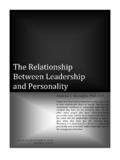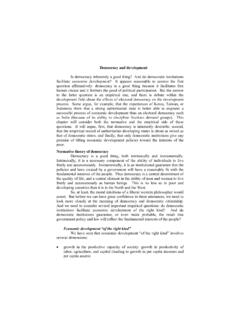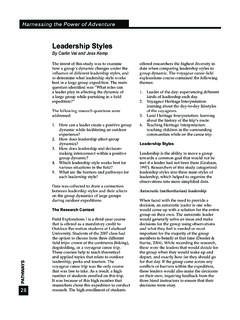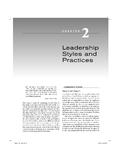Transcription of Parenting Practices Scale: Its Validity and Reliability ...
1 Received: May 9, 2016 Revision received: October 18, 2016 Accepted: November 28, 2016 OnlineFirst: April 10, 2017 Copyright 2017 June 2017 17(3) 745 769 Research ArticleKURAM VE UYGULAMADA E T M B L MLER EDUCATIONAL SCIENCES: THEORY & PRACTICE1 Correspondence to: Hanife Kahraman (PhD), Department of Educational Sciences, Faculty of Education, Guidance and Psychological Counseling Program, Ege University, Bornova, Izmir 33040 Turkey. Email: Department of Psychology, Faculty of Letters, Ege University, Bornova, Izmir 33040 Turkey. Email: Department of Educational Sciences, Faculty of Education, Measurement and Evaluation in Education Program, Ege University, Bornova, Izmir 33040 Turkey.
2 Email: Kahraman, H., Yilmaz Irmak, T., & Basokcu, T. O. (2017). Parenting Practices Scale: Its Validity and Reliability for parents of school-aged children. Educational Sciences: Theory & Practice, 17, 745 769. Practices are a field in psychology in which numerous studies have been carried out. In western countries, attempts to define the concept operationally have led to the emergence of many scales claiming to test the concept. This study aims at developing a scale to evaluate the Parenting Practices of parents with schoolchildren and at carrying out the Validity and Reliability tests of the scale in question.
3 In the study, 511 parents with schoolchildren between the ages of 6-13 participated. The initial scale consisted of 84 items. Explanatory factor analysis was applied in order to analyze the construct Validity and factor structure of the scale, whereas principle component analysis and the varimax rotation technique were used as the factoring technique. Following analysis, 32 items were removed from the scale. The final version of the scale consists of six components (sub-dimensions) and 52 items that explain of the variance. Afterwards, second-order confirmatory factor analysis was applied, and model data fit was observed to be high.
4 Cronbach alpha values of the scales sub-dimensions were found to be between .65 and .79. Criterion Validity of the scale was also tested during the study. To this end, the Parenting Practices Scale (PPS) and Parental Acceptance-Rejection Questionnaire (PARQ) were used. The correlation between sub-dimensions and total score was analyzed in the study, in which 168 parents participated in total. The findings support the criterion Validity of the scale. Moreover, the results prove that the developed scale has the ability to validly test existing differences among parents Parenting Practices and the psychological structures leading to Parenting Practices School-age children Parenting style Parenting Practices Scale Hanife Kahraman1 Ege UniversityTurkan Yilmaz Irmak2 Ege UniversityT.
5 Oguz Basokcu 3 Ege UniversityParenting Practices Scale: Its Validity and Reliability for Parents of School-Aged Children746 EDUCATIONAL SCIENCES: THEORY & PRACTICEAs a main research area of psychology, Parenting is a rather comprehensive field that is explored by many researchers in various disciplines throughout the world from the perspectives of biology, genetics, sociology, anthropology, history, and law. Parents mainly focus on three basic goals all over the world. These goals are providing children with the necessities of health and safety, preparing them for life as adults, and transmitting cultural values to them (American Psychological Association, 2010).
6 In this field, the transmission process is known as psychology, Parenting is defined as giving the necessary support to a child in order for them to develop physically, emotionally, socially, and intellectually/cognitively (Baydar, Ak nar, & mer, 2012). This definition of support that is given to a child in their growth process and the first studies by psychodynamic and learning theorists on its effects on child development, in parallel with the research done on child socialization, date back to the 1930s. That research has intended to answer two main questions: Which Parenting model should be adopted in child rearing, and what are the developmental consequences of different child-rearing patterns on children (Darling & Steinberg, 1993)?
7 Psychodynamic theorists in their effort to answer these questions have focused more on quality of the emotional relationship and satisfaction in the parent/child relationship, while learning theorists focus more on observable parent behaviors, such as the principles that are reinforced, observance of the determined common-space usage rules, and administration of physical punishment onto the child (Cavell, 2002).In the field, although parents child-rearing patterns, namely the child s socialization process, have been studied systematically for quite some time, the phenomenon began being studied empirically when Baumrind (1971) defined the concept of Parenting style.
8 Baumrind defines Parenting style as the values and beliefs about the child-rearing process that reveal the nature of the child, the emotions of the parents for the child, and parents child-rearing Practices . Unlike earlier researchers, Baumrind classified the different authority styles parents adopt in the child-rearing process into three groups: democratic, authoritarian and permissive. Thus, promoting the concept of Parenting style as operational, she claimed these styles had different developmental consequences on Baumrind s approach as their base, Maccoby and Martin (1983) claimed it would be better if Parenting styles are dealt within the four categories that emerge from the intersection of two main dimensions: parents sensitivity toward the demands of their children (interest/acceptance) and parents demands from their children (control/discipline).
9 These styles were identified as democratic/balanced (high sensitivity, high demand), authoritarian (low sensitivity, high demand), permissive (high sensitivity, 747 Kahraman, Yilmaz Irmak, Basokcu / Parenting Practices Scale: Its Validity and Reliability for Parents of School-Aged Childrenlow demand), and uninvolved/negligent (low sensitivity, low demand) Parenting and Steinberg (1993) suggested a holistic model for better understanding of how Parenting styles affect child socialization. In this model, researchers claimed that Parenting goal, Parenting practice, and Parenting styles together create Parenting .
10 They stated that to evaluate elements affecting child development, making a distinction between Parenting style and Parenting practice is really important because parents can have similar Parenting styles but different Parenting Practices (Stevenson-Hinde, 1998; Steinberg, Lamborn, Darling, Mounts, & Dornbusch, 1994). For instance, both use the democratic/balanced Parenting style and explain the logic behind a rule, but where one mother lets her child play in the park to feel energetic about preparing for studying, another mother demands her child to study as soon as the child comes home from school.
















